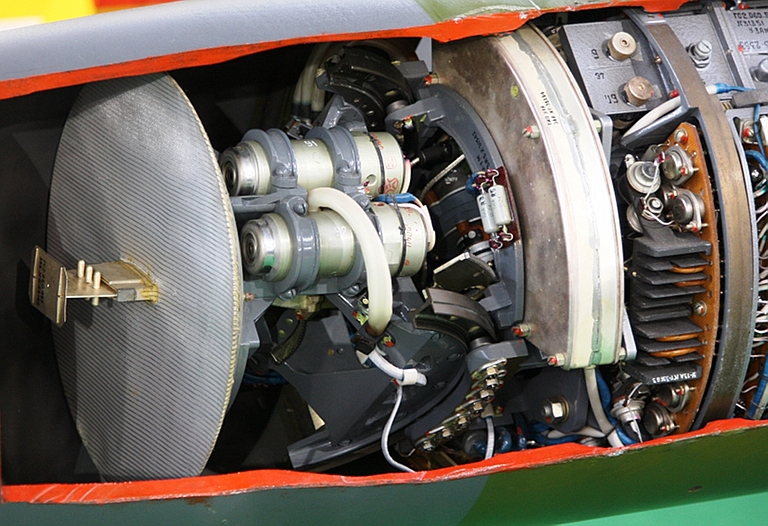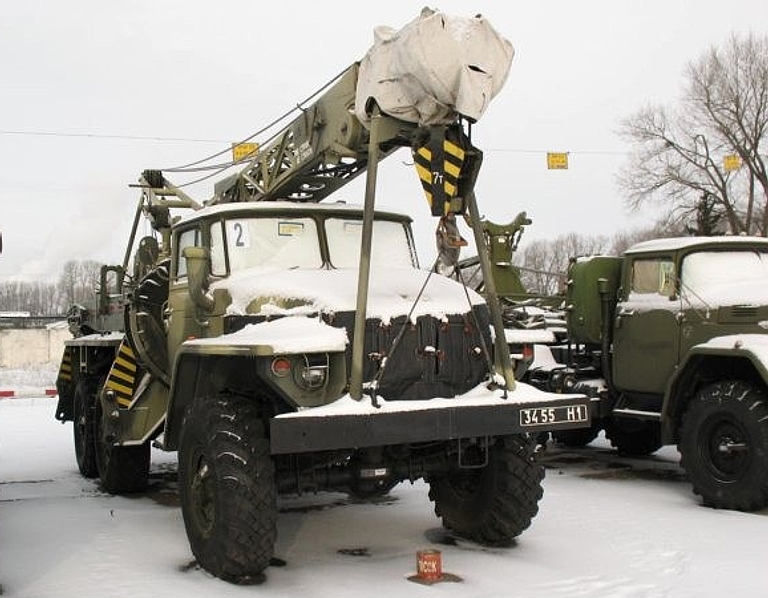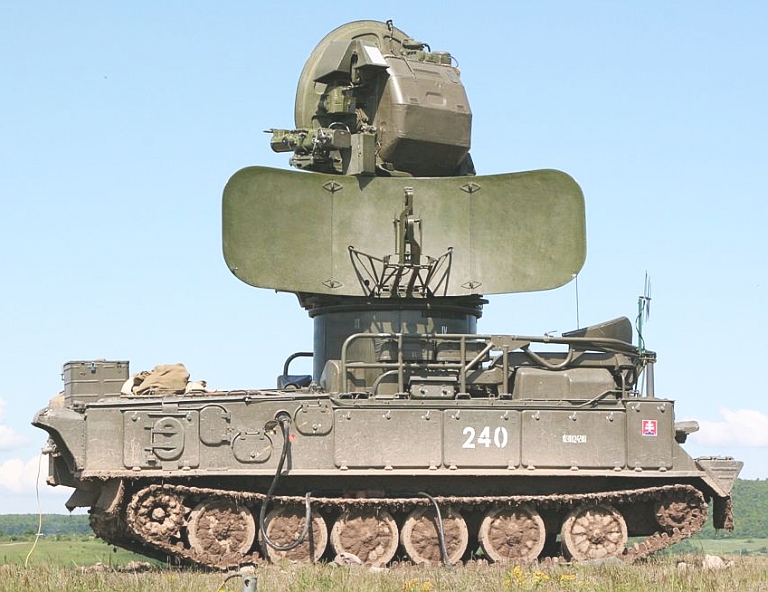|
||||||||||||||||||||||
![Home - Air Power Australia Website [Click for more ...]](APA/APA-Title-Main.png) |
||||||||||||||||||||||
![Sukhoi PAK-FA and Flanker Index Page [Click for more ...]](APA/flanker.png) |
![F-35 Joint Strike Fighter Index Page [Click for more ...]](APA/jsf.png) |
![Weapons Technology Index Page [Click for more ...]](APA/weps.png) |
![News and Media Related Material Index Page [Click for more ...]](APA/media.png) |
|||||||||||||||||||
![Surface to Air Missile Systems / Integrated Air Defence Systems Index Page [Click for more ...]](APA/sams-iads.png) |
![Ballistic Missiles and Missile Defence Page [Click for more ...]](APA/msls-bmd.png) |
![Air Power and National Military Strategy Index Page [Click for more ...]](APA/strategy.png) |
![Military Aviation Historical Topics Index Page [Click for more ...]](APA/history.png)
|
![Intelligence, Surveillance and Reconnaissance and Network Centric Warfare Index Page [Click for more ...]](APA/isr-ncw.png) |
![Information Warfare / Operations and Electronic Warfare Index Page [Click for more ...]](APA/iw.png) |
![Systems and Basic Technology Index Page [Click for more ...]](APA/technology.png) |
![Related Links Index Page [Click for more ...]](APA/links.png) |
|||||||||||||||
![Homepage of Australia's First Online Journal Covering Air Power Issues (ISSN 1832-2433) [Click for more ...]](APA/apa-analyses.png) |
||||||||||||||||||||||
| Last Updated: Mon Jan 27 11:18:09 UTC 2014 | ||||||||||||||||||||||
|
||||||||||||||||||||||
|
NIIP
2K12 Kub/Kvadrat
Self Propelled Air Defence System / SA-6 Gainful НИИП Cамоходный Зенитный Ракетный Комплекс 2К12 Куб/Квадрат Technical Report APA-TR-2009-0701 |
||||||||||||||||||||||||||||||||||||||||||||||||||||||||||||||||||||||||||||||||||||||||||||||||||||||
| by
Dr Carlo Kopp, AFAIAA, SMIEEE, PEng July 2009 Updated April, 2012 Text, Line Art © 2009 - 2012 Carlo Kopp
|
||||||||||||||||||||||||||||||||||||||||||||||||||||||||||||||||||||||||||||||||||||||||||||||||||||||
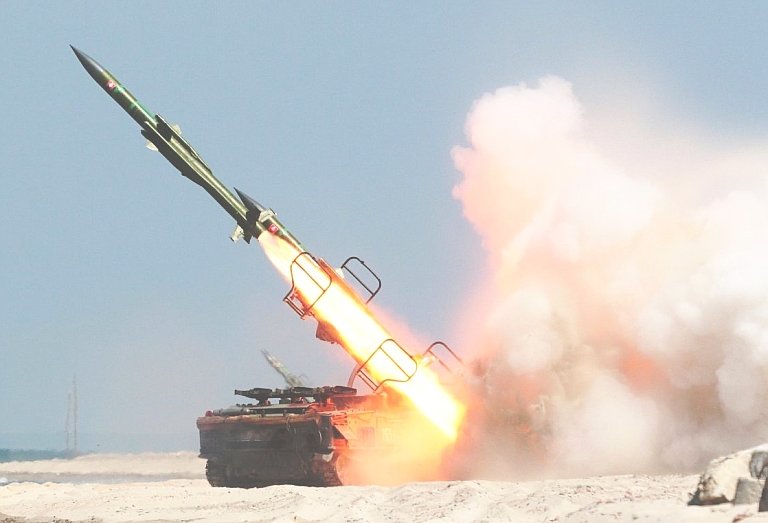 3M9ME
Gainful SAM launch from TEL (Image © Miroslav Gyűrösi).
|
||||||||||||||||||||||||||||||||||||||||||||||||||||||||||||||||||||||||||||||||||||||||||||||||||||||
|
||||||||||||||||||||||||||||||||||||||||||||||||||||||||||||||||||||||||||||||||||||||||||||||||||||||
BackgroundThe 2K12 Kub Surface to Air
Missile system was developed for PVO-SV (Soviet Army Air Defence) and
other Warpac Armies to perform a role analogous to that of the S-125 /
SA-3 Goa in the service of the PVO. As such it was to supplement the
larger and longer ranging 2K11 Krug / SA-4 Ganef with low
altitude coverage. Design objectives were similar but more ambitious
than those for the S-125 / SA-3 Goa: destruction of aircraft at speeds
between 420 m/s to 600 m/s (820 KTAS to 1,200 KTAS), at altitudes
between 100 to 200 m (~300 to 600 ft AGL) and 5 to 7 km (16,4 kft to 23
kft), at ranges of up to 20 km (~11 NMI), with a single shot Pk
of 0.7.
Development was authorised in 1958, with the system design assigned to what is now the Tikhomirov NIIP, and the missile design to what is now Vympel. The design was to be self propelled and highly mobile, like the 2K11 Krug / SA-4 Ganef, but using a lightweight tracked chassis similar to that used by the ZSU-23/4P Shilka SPAAG. The ambitious specifications and the use of immature technology, such as the Continuous Wave (CW) semi-active homing missile seeker, and solid propellant ramjet sustainer powerplant, resulted in a troublesome and protracted development process. Problems with the seeker and the powerplant resulted in numerous test failures, with the design only achieving IOC in 1967-1968, a decade after the launch of the project. Production continued until 1983, when the 9K37 Buk / SA-11 Gadfly replaced it in production. The design concept was for a single self-propelled 1S91 engagement radar system, with an integrated acquisition radar, controlling a group of four 2P25 series Transporter Erector Launcher (TEL) vehicles, each with three 3M9 series missile rounds. This battery structure would be supported by several 2T7 transloader/transporters, carried on the ZiL-157 truck. The 1S91 engagement radar system used two stacked turrets, the lower of which mounted the acquisition radar, and the upper the fine tracking and CW illuminator radar. This allowed the system to acquire targets and perform coarse tracking with the acquistion radar, and then perform fine tracking and illumination with the second radar. This provided much greater autonomy compared to the 2K11 Krug / SA-4 Ganef which like the PVO systems, required a separate acquistion radar and datalinks to cue the engagement radar. A number of variants were developed over the production life of the system. The first of these was the 2K12M Kub M1, which included a greater engagement envelope, a missile seeker with better ability to defeat seduction countermeasures, the capability to interrupt radar emissions in order to evade AGM-45 Shrike ARMs, and support for an ARM decoy. It was initially deployed in 1973. In 1976, the 2K12M3 Kub M3 was introduced, with further incremental improvements against the M1 variant, especially in missile speed and a cited capability to defeat an 8G target. 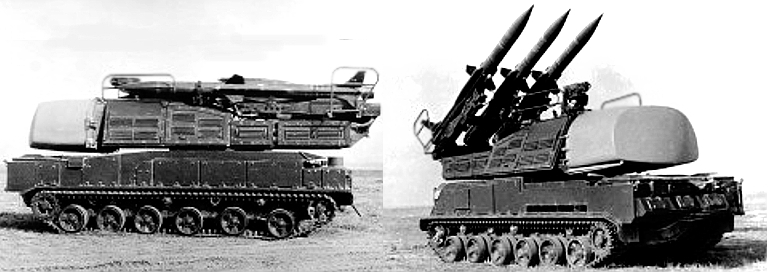 The 2K12M4 Kub M4 was a variant which was for all intents and purposes a compatible hybrid with the 9M38 Buk / SA-11 Gadfly. Depicted a 9A38 TEL with 9S35 Fire Dome track/illuminate radar and 3M9M3 rounds (RuMoD image). The final 2K12M4 Kub M4 variant was a hybridised 1978 design, with the 1S91M3 radar system being capable of controlling the 2P25M3 and SA-11 9A38 TELs and guiding the 3M9 and SA-11 9M38 missiles. The 9A38 TEL variant was also capable of carrying the 3M9 missile and providing terminal tracking and illumination using the 9S35 Fire Dome radar on the TEL. Export variants, usually marketed under the name 2K12E Kvadrat, appeared in the Middle East following the War of Attrition. The combat debut of the 2K12 / SA-6 was during the Yom Kippur war of 1973. The superior low altitude performance of the weapon, and its new CW semi-active missile seeker resulted in a much higher success rate compared to the earlier S-75 / SA-2 Guideline and S-125 / SA-3 Goa systems. While exact losses continue to be disputed, around 40 aircraft are usually cited as lost to SAM shots, and the 2K12 / SA-6 proved most effective of the three weapons. The 2K12 Kub/Kvadrat / SA-6 Gainful is a fully mobile system, capable of shooting and scooting in 5 minutes. The system was however often deployed from fixed revetments during Middle Eastern conflicts. The system never repeated its initial success in subsequent conflicts, in part because examples were captured and analysed during the 1970s and 1980s. The US widely deployed the ALQ-162 Compass Sail CW jammer specifically to defeat this system. Conflicts in which the weapon was known to have been used include the Angolan intervention by Cuba, the Chad conflict, the 1982 Israeli invasion of Southern Lebanon, the Desert Storm and subsequent Northern/Southern Watch operations, and the 1999 Allied Force campaign. 1S91 Straight Flush Engagement RadarThe 1S91
fully mobile engagement radar system comprises two independently
steerable radar systems. The lower 1S11 with a paraboloid section
antenna and stacked feeds is used to acquire and track multiple targets
in azimuth and elevation. The upper 1S31 is used for precision target
tracking and illumination of targets for semi-active missile homing
guidance.
A more detailed discussion can be found under Engagement and Fire Control Radars. 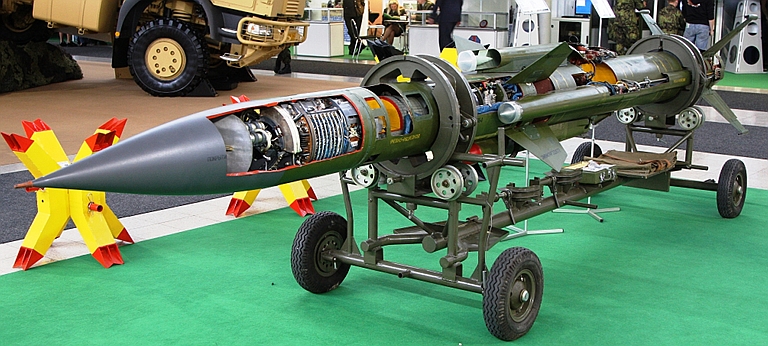 Above, below, 3M9ME-UR
(Uchebno-Razreznaya) cutaway training round. Note the ramjet inlet
structures and the compressed air lines. Refer cutaway index below
(images © Miroslav
Gyűrösi).
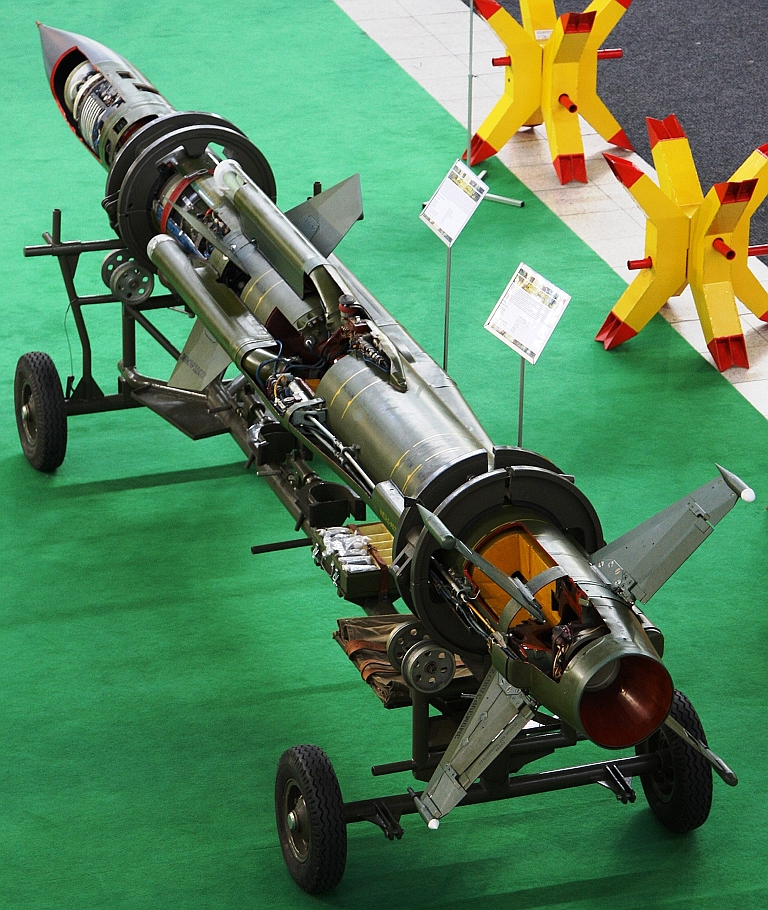 
Vympel 3M9 / 9M9 Surface to Air MissileWhile the long range ramjet 2K11 Krug /
SA-4 Ganef has direct Western equivalents in the contemporary ramjet
Bendix RIM-8 Talos, Bristol Bloodhound and Armstrong Whitworth Sea
Slug, no such equivalent exists for the 2K12 Kub / SA-6 Gainful system.
In terms of airframe and propulsion configuration, the nearest
equivalents are the 3M80 Moskit / Sunburn and Kh-31 Krypton supersonic
anti-ship missile. The 3M9 missile design introduced the
first solid propellant ramjet engine in a Soviet missile, resulting in
a missile with superior range performance to its conventional solid
rocket competitors, as the missile did not need to carry the mass of
the full oxidiser component of the propellant. 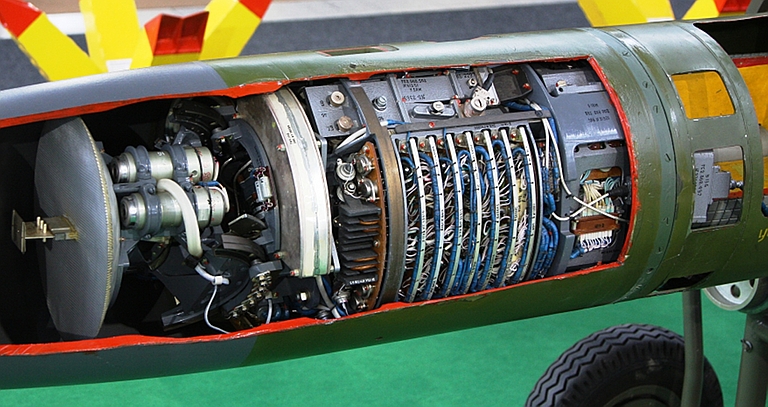
Above, below,
3M9ME
Gainful - Agat 1SB4ME
monopulse CW
SARH seeker. Note the polarisation screen over the reflector and the
unique feed arrangement with matching stubs. This antenna arrangement
is retained by later 3M37/38/317 / SA-11/17 Gadlfy/Grizzly series
missile seekers (images © Miroslav
Gyűrösi).
The nose of the missile houses the Agat
designed 1SB4M
CW semi-active
homing coherent dual plane monopulse seeker, which employs a parabolic
section
reflector antenna which produces monopulse sum and pitch/yaw difference
signals. The seeker also uses the difference in Doppler
between the illuminator carrier frequency and backscatter from the
target to estimate the closure rate between the missile and target. An
adaptive tunable narrowband filter is claimed to be used to reject
clutter. The seeker is analogue and in addition to producing pitch/yaw
commands for the autopilot, it activates the proximity fuse. Trial shots performed by the UK on a test
range, using a 2K12
Kub / SA-6 system captured in Africa, were reported to have resulted in
remarkably high accuracy against drone targets. Due to the absence of seeker cooling, the missile seeker can be powered up on the launch rail for 5 to 10 minutes before it overheats and must be powered down to cool off. Training emulator rounds have characteristic cooling fins on the seeker section for this reason. The 3E27 CW two channel radio proximity fuse will nominally trigger at a 30 m distance from the target, using antennas on the sides of the fuselage. The 3N12 57 kg blast-fragmention warhead
is mounted behind the fuse. 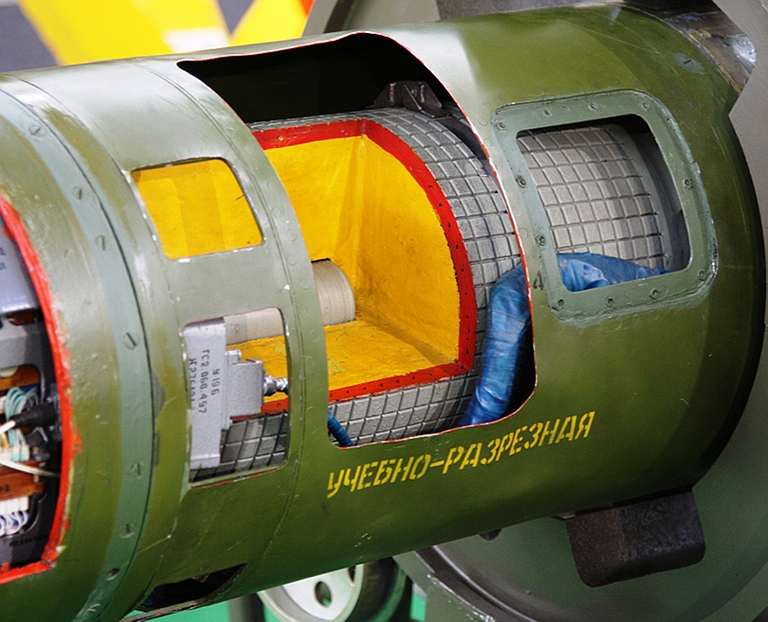
The 3N12 series
fragmentation warhead. Note the preformed casing (image © Miroslav
Gyűrösi). The 1SB6M autopilot uses a gyro and
accelerometer package, and generates steering commands for actuators
which move the cruciform wings. Electrical power is produced by a
turbine driven generator, fed from a tank of compressed air. Two umbilicals connect the missile to the
launch rail, these are used to initialise the missile and power the
seeker prelaunch, and monitor missile status and condition. The aft fuselage contains the annular solid propellant first stage booster, with a launch mass of ~172 kg and a length of 1.7 metres, using VIK-2 propellant. The igniter initiates a burn along the central 5.4 cm dia. cavity. The engine has burn duration of about 3 to 6 seconds and accelerates the missile from 0 to ~ Mach 1.5. Once the booster has burned out, it becomes the combustion chamber / nozzle for the solid propellant rocket ramjet. Four symmetrically placed air inlets feed into this chamber. Frangible fibreglass covers are used to prevent air ingestion prior to sustainer ignition. The centre fuselage contains the gas generator fuel charge for the solid propellant ramjet operation. The 9D16K sustainer solid gas generator charge comprising 67 kg of LK-6TM reducing propellant is ignited and the hot gas discharge vents into the combustion chamber, where it is mixed with air to burn and generate sustainer thrust. Burn duration is ~20 seconds, during which the missile accelerates to a peak velocity of ~2.8 Mach. Russian sources claim that the sustainer cannot be throttled and as a result this limits choices in missile trajectories. The cruciform tails mount the missile transponder antennas, and include additional trailing edge controls. All controls are pneumatically actuated. Production and Exports
|
||||||||||||||||||||||||||||||||||||||||||||||||||||||||||||||||||||||||||||||||||||||||||||||||||||||
2K12 Technical Data
|
||||||||||||||||||||||||||||||||||||||||||||||||||||||||||||||||||||||||||||||||||||||||||||||||||||||
|
SAM System Mobility - Air Defence System Vehicles [Click for more ...] SAM System Integration - Air Defence Command Posts [Click for more ...] SAM System Passive Targeting - Emitter Locating Systems [Click for more ...] SAM System Counter VLO Capabilities [Click for more ...] SAM System Multimedia - Rosoboronexport Footage [Click for more ...] |
||||||||||||||||||||||||||||||||||||||||||||||||||||||||||||||||||||||||||||||||||||||||||||||||||||||
2K12 Battery Components |
||||||||||||||||||||||||||||||||||||||||||||||||||||||||||||||||||||||||||||||||||||||||||||||||||||||
|
||||||||||||||||||||||||||||||||||||||||||||||||||||||||||||||||||||||||||||||||||||||||||||||||||||||
|
|
||||||||||||||||||||||||||||||||||||||||||||||||||||||||||||||||||||||||||||||||||||||||||||||||||||||
2P25 Transporter Erector Launcher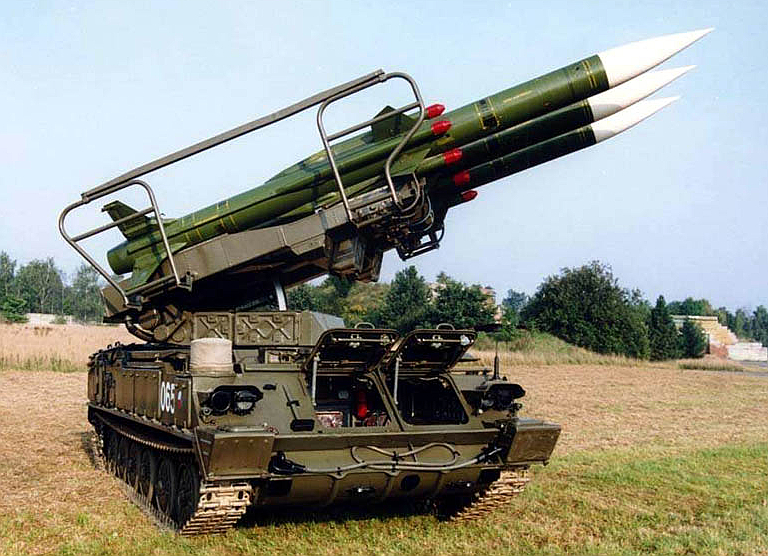 |
||||||||||||||||||||||||||||||||||||||||||||||||||||||||||||||||||||||||||||||||||||||||||||||||||||||
2T7/2T7M Transporter/Transloader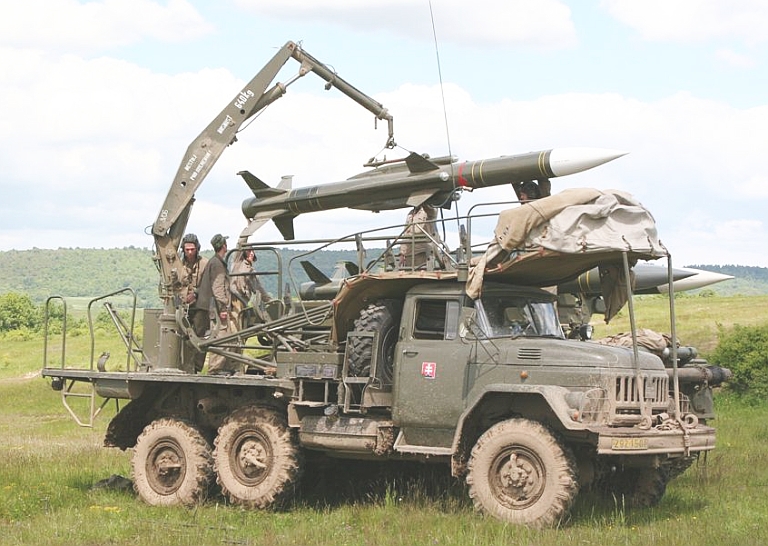 2T7M Gainful transloader of the Slovakian Army (Image © Miroslav Gyűrösi). 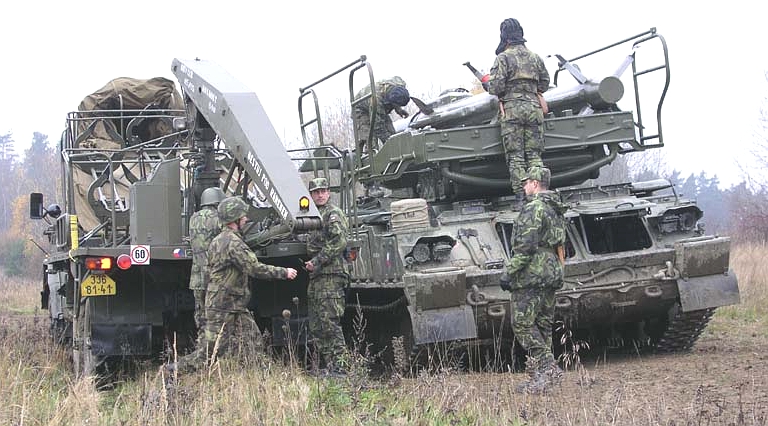 2P25 TEL and 2T7M transloader of the Czech Army (Czech Army image). |
||||||||||||||||||||||||||||||||||||||||||||||||||||||||||||||||||||||||||||||||||||||||||||||||||||||
|
The
9T32M1 self-propelled crane is a late model of the standard loading
crane used with 2K12 / SA-6 Gainful and 9K37M1 / SA-11 Gadfly
batteries. The Ural-375 chassis is used. (Russian internet).
|
||||||||||||||||||||||||||||||||||||||||||||||||||||||||||||||||||||||||||||||||||||||||||||||||||||||
|
|
||||||||||||||||||||||||||||||||||||||||||||||||||||||||||||||||||||||||||||||||||||||||||||||||||||||
P-40/1S12 Long Track Acquisition Radar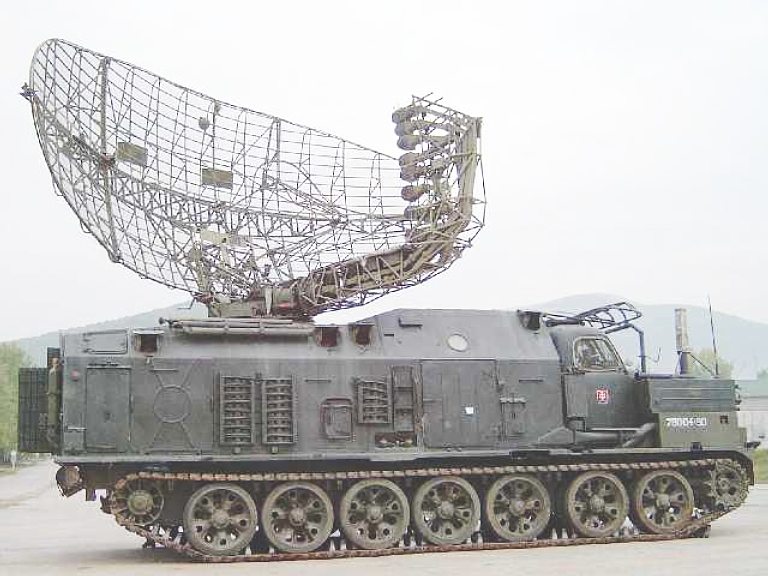 The P-40/1S12 Long Track S-band
acquisition radar is often cited as the mobile acquisition component in
Kub/Kvadrat SAM batteries, although its primary purpose was supporting
the SA-4 Ganef system. It uses a modified tank chassis to provide high
cross country mobility. The antenna stows flat on the roof of the
vehicle. Eight stacked beams are used for heightfinding.
|
||||||||||||||||||||||||||||||||||||||||||||||||||||||||||||||||||||||||||||||||||||||||||||||||||||||
P-15 / P-15M / P-19 Flat Face / Squat Eye Acquisition Radar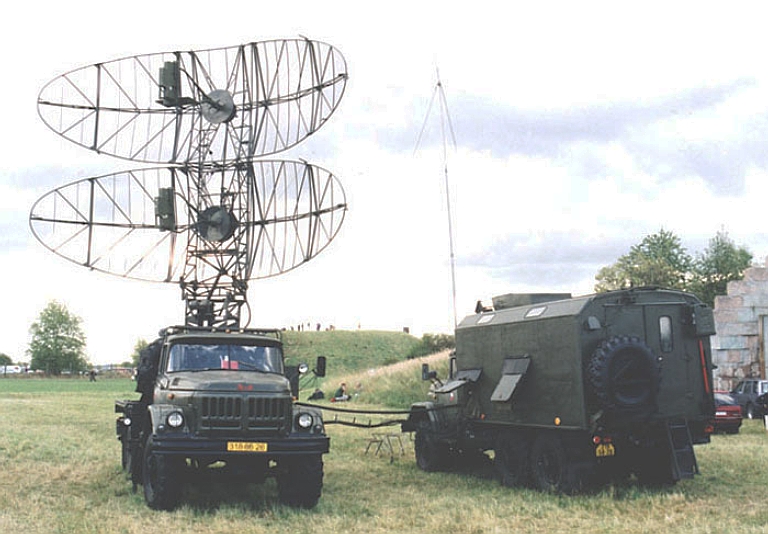 Late model P-19 Flat Face D
acquisition radar. The Flat Face and Squat Eye were frequently used as
acquisition radars for groups of 2K12 / SA-6 batteries, especially in
the Middle East.
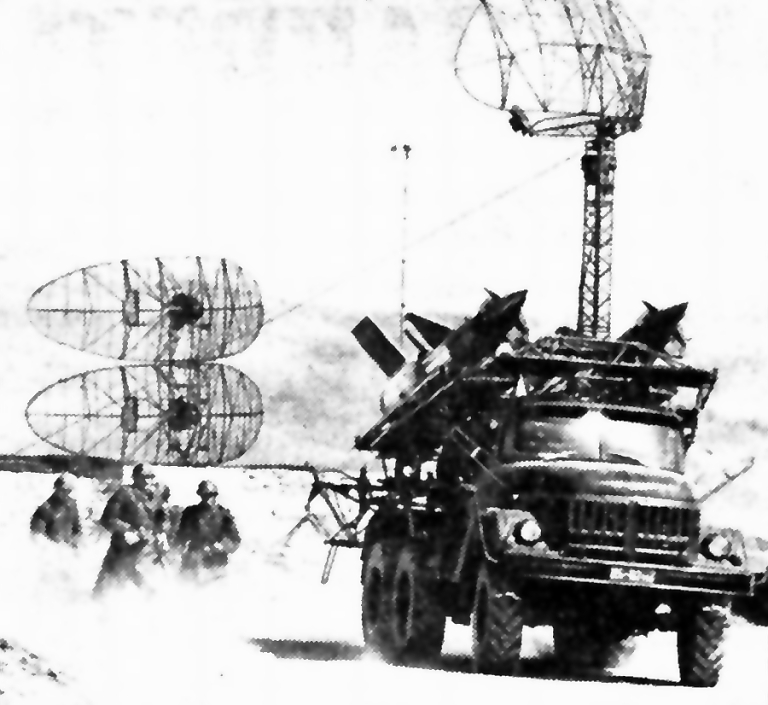 PR-14A , P-15 Flat Face and P-15M Squat
Eye. Note the antenna mast tether on the P-15M (Soviet MoD).
|
||||||||||||||||||||||||||||||||||||||||||||||||||||||||||||||||||||||||||||||||||||||||||||||||||||||
LEMZ PRV-16/1RL132 Naklon / Thin Skin Heightfinding Radar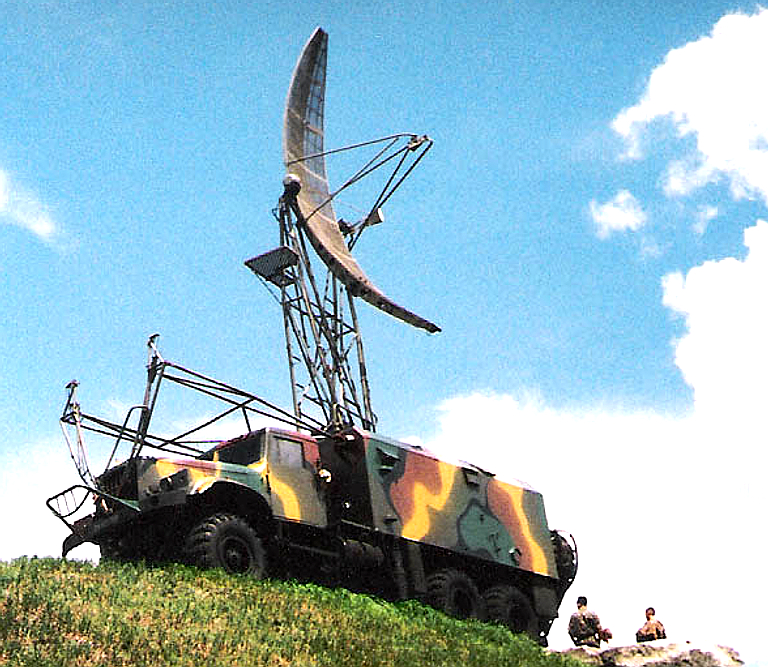 |
||||||||||||||||||||||||||||||||||||||||||||||||||||||||||||||||||||||||||||||||||||||||||||||||||||||
Operational Deployment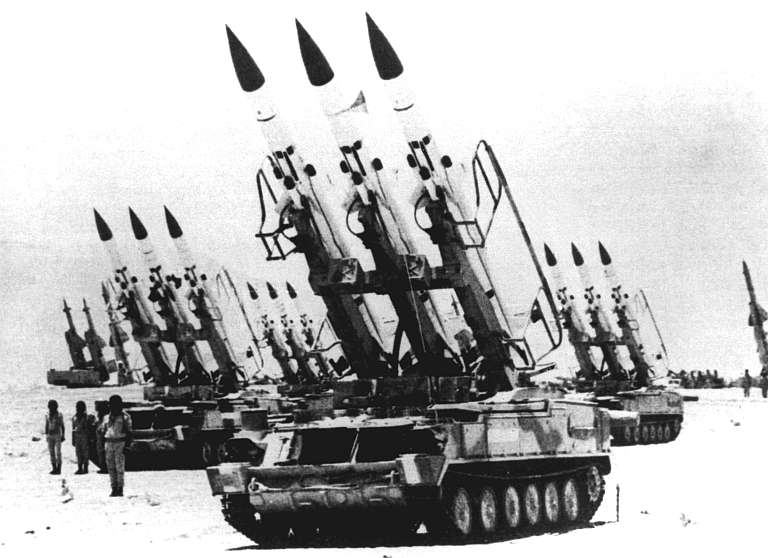 The 2K12E Kvadrat export variant was first
deployed to the Middle East during 1971. The system played an important
role in 1973, and has been a feature of conflicts in that region ever
since. Left background, S-125 / SA-3 Goa on 5P71 launcher, and S-75 /
SA-2 Guideline on SM-90 launcher (US DoD).
 2P25ME
Kvadrat TEL captured during OIF (US DoD).
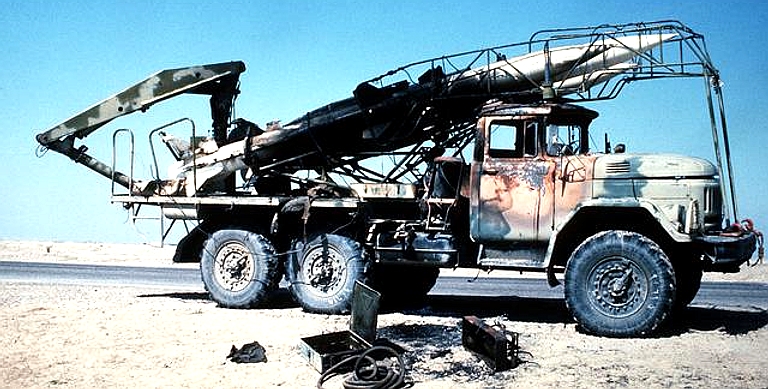 Destroyed 2T7ME Kvadrat transloader (US DoD). |
||||||||||||||||||||||||||||||||||||||||||||||||||||||||||||||||||||||||||||||||||||||||||||||||||||||
References/Sources
|
||||||||||||||||||||||||||||||||||||||||||||||||||||||||||||||||||||||||||||||||||||||||||||||||||||||
| Technical
Report APA-TR-2009-0701 |
||||||||||||||||||||||||||||||||||||||||||||||||||||||||||||||||||||||||||||||||||||||||||||||||||||||
|
|||||||||||||
![Sukhoi PAK-FA and Flanker Index Page [Click for more ...]](APA/flanker.png) |
![F-35 Joint Strike Fighter Index Page [Click for more ...]](APA/jsf.png) |
![Weapons Technology Index Page [Click for more ...]](APA/weps.png) |
![News and Media Related Material Index Page [Click for more ...]](APA/media.png) |
||||||||||
![Surface to Air Missile Systems / Integrated Air Defence Systems Index Page [Click for more ...]](APA/sams-iads.png) |
![Ballistic Missiles and Missile Defence Page [Click for more ...]](APA/msls-bmd.png) |
![Air Power and National Military Strategy Index Page [Click for more ...]](APA/strategy.png) |
![Military Aviation Historical Topics Index Page [Click for more ...]](APA/history.png)
|
![Information Warfare / Operations and Electronic Warfare Index Page [Click for more ...]](APA/iw.png) |
![Systems and Basic Technology Index Page [Click for more ...]](APA/technology.png) |
![Related Links Index Page [Click for more ...]](APA/links.png) |
|||||||
![Homepage of Australia's First Online Journal Covering Air Power Issues (ISSN 1832-2433) [Click for more ...]](APA/apa-analyses.png) |
|||||||||||||
| Artwork, graphic design, layout and text © 2004 - 2014 Carlo Kopp; Text © 2004 - 2014 Peter Goon; All rights reserved. Recommended browsers. Contact webmaster. Site navigation hints. Current hot topics. | |||||||||||||
|
Site Update
Status:
$Revision: 1.753 $
Site History: Notices
and
Updates / NLA Pandora Archive
|
|||||||||||||
|
|
Tweet | Follow @APA_Updates | |||||||||||
|
|
|||||||||||||
|
|
|||||||||||||
![F-111 Aardvark Index Page [Click for more ...]](APA/f-111.png)
![F/A-18 Hornet and Super Hornet Index Page [Click for more ...]](APA/fa-18a.png)
![Aerial Refuelling and Airlift Capabilities Index Page [Click for more ...]](APA/aar-lift.png)
![Directed Energy Weapons and Electromagnetic Bombs Index Page [Click for more ...]](APA/dew.png)
![Notices and Updates Index Page [Click for more ...]](APA/notices-128.png)
![APA NOTAM and Media Release Index Page [Click for more ...]](APA/notams-128.png)
![APA Research Activities and Policy / Technical Reports Index [Click for more ...]](APA/research-128.png)
![Search Air Power Australia Website [Click for more ...]](APA/search-128.png)
![Briefings and Submissions - Air Power Australia [Click for more ...]](APA/briefs-128.png)
![Air Power Australia Contacts [Click for more ...]](APA/contacts-128.png)
![Funding Air Power Australia [Click for more ...]](APA/funding-258.png)


